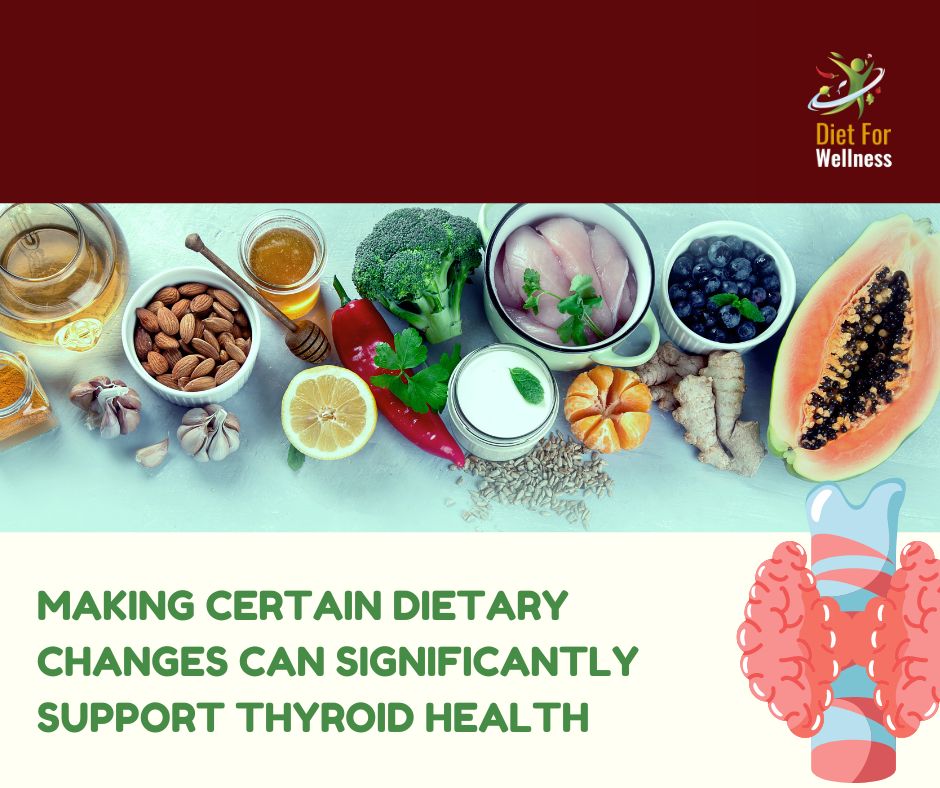Dietary Changes to Deal with Thyroid

The thyroid, a small butterfly-shaped gland located in the neck, plays a significant role in maintaining various bodily functions. It regulates metabolism, energy production, and body temperature, and influences other vital systems.
When the thyroid malfunctions, it can lead to health issues such as hypothyroidism or hyperthyroidism, affecting one’s overall well-being. While genetics and other factors contribute to thyroid problems, making certain dietary changes can significantly support thyroid health and potentially prevent issues from arising.
Knowing your Thyroid Health
Before delving into dietary adjustments, understanding the role of nutrition in thyroid health is crucial. The thyroid gland requires specific nutrients like iodine, selenium, zinc, iron, and vitamins such as A, D, and B complex to function optimally. These nutrients aid in hormone production, metabolism regulation, and overall gland health.
Dietary Changes to Support Thyroid Health
1. Iodine-Rich Foods
Iodine is an essential component in the process of thyroid hormone synthesis. Incorporate iodine-rich foods like seaweed, iodized salt, dairy products, and seafood (such as cod and shrimp) into your diet. However, excessive iodine intake may also lead to thyroid issues, so moderation is key.
2. Selenium Sources
Selenium acts as an antioxidant and supports the conversion of thyroid hormones. Foods like Brazil nuts, fish, eggs, sunflower seeds, and mushrooms are excellent sources of selenium.
3. Balanced Diet
Maintaining a balanced diet comprising whole grains, lean proteins, fruits, and vegetables is crucial. Ensuring adequate intake of vitamins and minerals supports overall health, benefiting the thyroid gland as well.
4. Limit Goitrogenic Foods
Goitrogens are compounds that may interfere with thyroid function by blocking iodine absorption. Foods like cabbage, broccoli, cauliflower, kale, and spinach contain goitrogens. Cooking these can reduce the goitrogenic effects that these foods have.
5. Mindful Soy Consumption
Soy products contain goitrogens and can potentially impact thyroid function, particularly when consumed in excessive amounts. Moderation in soy consumption is advised, especially for those with thyroid concerns.
6. Reduce Processed Foods
Highly processed foods, including refined sugars, trans fats, and excess sodium, can negatively impact overall health, including thyroid function. Instead choose whole, unprocessed foods as much as possible.
7. Hydration and Limiting Caffeine
Staying adequately hydrated is essential for overall health, including thyroid function. Additionally, excessive caffeine intake can potentially interfere with thyroid hormone absorption. Moderation is key.
While dietary changes can support thyroid health, they are not a cure-all. Consulting a healthcare professional, especially if experiencing thyroid-related symptoms, is essential for accurate diagnosis and treatment. Additionally, individual nutritional needs vary, so personalized guidance from a healthcare provider or registered dietitian is crucial before making significant dietary changes, especially for those with existing thyroid conditions or concerns.
You should adopt a balanced diet rich in essential nutrients and mindfully consume foods to potentially support your thyroid health and contribute positively to your overall well-being. Taking proactive steps towards a healthier lifestyle can play a vital role in preventing thyroid problems and promoting optimal health.
